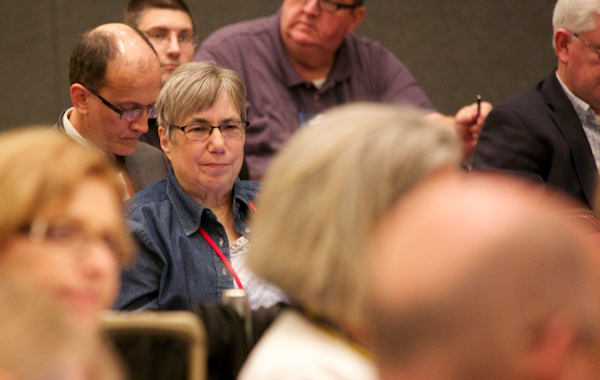Three Rural Advocates from the Michigan Area are offering legislative witness at General Conference.
KAY DEMOSS
Senior Editor-Writer, Michigan Area
Not all Michigan folks attending General Conference are delegates. And yet they come having vital ministry to do.
Meet Peggy Paige, Carl Litchfield and Jodie Flessner, all present in Portland as Rural Advocates. Peggy has long been active in issues of town and country. She has held offices in the Detroit Conference she calls home and she is now the Vice Chair of the National United Methodist Rural Advocates. Carl and Jodie travelled to Portland from West Michigan and their roots also go deep in support of rural America.
Started in 1940 as the Rural Fellowship, in 2012 the organization changed its name to United Methodist Rural Advocates. This is Peggy’s second time in Portland for General Conference, active for rural concerns in 1976 and again in 2016.
GCdaily sat down with Jodie and Peggy to learn more. Carl was involved elsewhere in servant ministry on behalf of the group.
As the name suggests, the Rural Advocates are planters of seeds and it takes time for some of those seeds to grow. Jodie and Peggy listed some of the General Conference actions facilitated by UMRF/UMRA over the past 20 years:
- Recognition of clergy rights for Local Pastors;
- creation of the Certified Lay Minister program;
- development of Personal Energy Transports (PETs);
- organization of the Rural Chaplaincy for both clergy and laity.
“We would like to see more progress,” Peggy smiles, “but we have come a long way.”
This year at General Conference, Jodie and Peggy are among 40 members of UMRA who are observing in Legislative Committees. Peggy is sitting in General Administration and Jodie is watching and listening where Higher Education and Superintendency is at work.
Peggy explains that in previous years UMRA has sent upwards of 100 petitions to General Conference; this year there are 14 with titles such as: “Rural Communities in Crisis”; “Connectional Table Membership”; “Disposition of Property of a Closed Local Church”; “Facilitation of Cooperative Ministry”; and “Support and Protection of Rural People.” Their role is to observe and to be “legislative witnesses” when and where they are able.
Regarding 2016 legislation UMRA members have identified three priorities:
- Retain support for Certified Lay Ministry;
- To retain or increase rights and responsibility for Licensed Local Pastors;
- Ensure groups like UMRA can continue to send in petitions and resolutions to the 2020 General Conference.
While at General Conference opportunities present themselves for UMRA members to share with delegates how certain legislation will make a difference – positive or negative—for rural people or small churches.
Jodie makes the point that often rural advocates have collaborated with urban advocates, “because the issues of inner city and village can be quite similar.” Further, “small churches may be both urban and rural.”

“We chose to limit the number of our petitions this time on purpose,” Peggy says. The UMRA hopes to be a “calming presence” offering a place where people can experience down-home hospitality. Their focus remains on simple human needs. They make copies for those who need them, share meals with those who may have run low on funds, give assistance in drafting amendments to legislation and “we’ve even sewn on buttons,” Jodie laughs. And there’s bread, peanut butter and jelly available in their hotel rest area open to all delegates.
The women shared an interesting perspective … the population of rural America is seven times the population of New York City. “But rural people sometimes go unnoticed and unsupported because they are not concentrated in one place,” Jodie notes.
“We do not take a stand on controversial issues,” Peggy continues. “We are intentional in our appreciation of the diversity of theological and social issues stances that exist among us. We have differences but we are still the church together.” Jodie adds, “That makes us a model for The United Methodist Church. We in UMRA know what we agree on and we work on those things. The rest we are willing to let go of for the sake of the Gospel.”
All that UMRA does in settings like General Conference is for the benefit of the people on the ground back home. “It took UMRA years to change Paragraph 35,” Jodie says. She went on to remember the Rev. Ward Pierce, a beloved and now deceased Local Pastor from West Michigan, for “getting me started in these issues.” And with emotion she spoke of the day at Annual Conference when Ward celebrated his first-time opportunity to vote for clergy delegates to General Conference some 40 years after he began serving as a Local Pastor.
Seeds are planted. Seeds grow. New life begins.
Learn more about UMRA at www.umruraladvocates.org or on Facebook UMRA2016GC.
Last Updated on December 8, 2023

